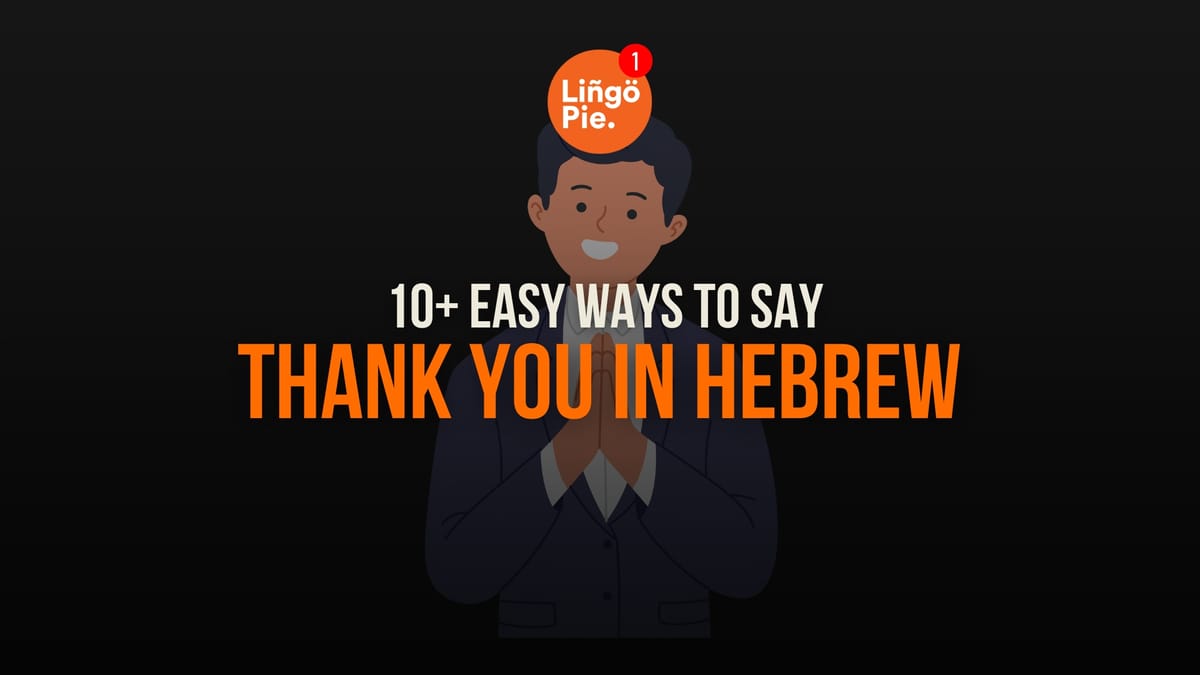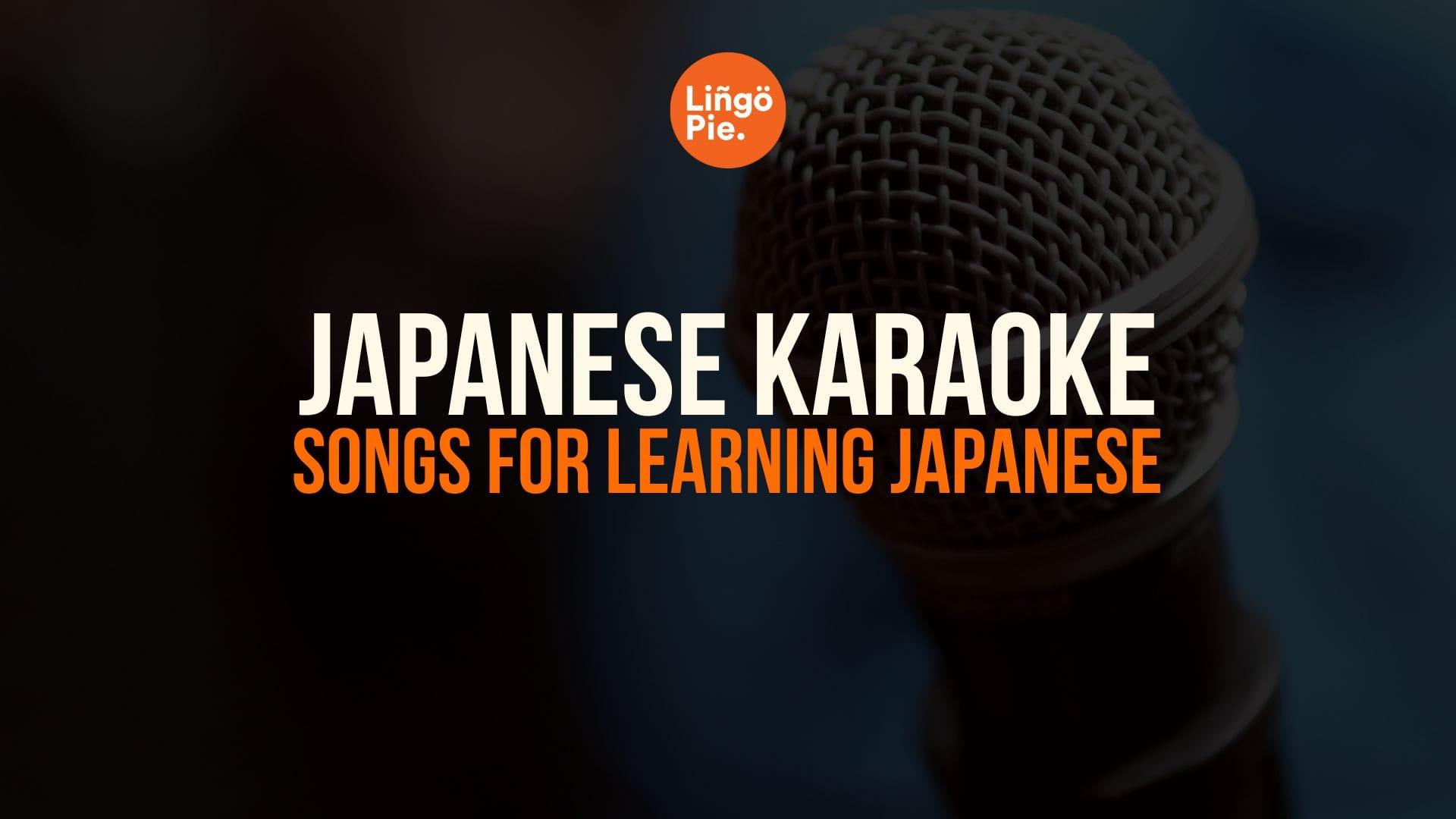Most people pick up a few Hebrew words from Jewish prayers or Israeli news, but they stumble when trying to have actual conversations. You might know "shalom" and recognize Hebrew letters, but when an Israeli helps you with directions or holds a door, you freeze up because you have no idea how to respond appropriately.
Israeli culture has specific expectations around showing appreciation. Use the wrong level of gratitude and you either sound rude or overly dramatic. Some situations call for casual responses while others need more formal acknowledgment. This guide shows you exactly which expression fits each situation so you can respond naturally instead of standing there awkwardly silent.
- Tandem Review: We Tested the App Everyone’s Comparing to Tinder
- Lingoda Review: Costly But Effective? Here’s the Truth!
- Mondly Review: Does Pearson’s AI-Powered App Live Up to the Hype?

How to Say Thank You in Hebrew
Hebrew offers many ways to express gratitude, from simple everyday thanks to deeply emotional expressions. Learning these different expressions helps you communicate more naturally with Hebrew speakers and shows you understand the nuances of their language.
תודה (Toda) - Basic Thank You
Pronunciation: toh-DAH
This word serves as your everyday thank you in Hebrew. For instance, use "toda" when someone holds a door, gives directions, or provides basic courtesy. The word stems from the Hebrew root meaning "to acknowledge" or "to confess," which connects gratitude with recognition of someone's kindness.
תודה רבה (Toda Raba) - Thank You Very Much
Pronunciation: toh-DAH rah-BAH
When "toda" feels insufficient, add "raba" to express deeper gratitude. For example, this word works when someone goes beyond normal helpfulness - giving detailed directions, helping with heavy bags, or spending extra time helping you. Also, "raba" means "much" or "a lot," which intensifies your appreciation without sounding overly formal.
תודה על (Toda Al) - Thank You For [Something]
Pronunciation: toh-DAH al
I recommend using this structure when thanking someone for a specific item or action. For instance, follow "toda al" with the thing you're grateful for: "toda al ha'ezra" (thank you for the help) or "toda al ha'matana" (thank you for the gift). Grammatically, the preposition "al" here connects your gratitude directly to what prompted it, making your thanks more precise and meaningful.
תודה ש (Toda She) - Thank You For [Doing Something]
Pronunciation: toh-DAH sheh
This construction thanks someone for performing an action. For example, "Toda she" connects to verbs: "toda she'azarta li" (thank you for helping me) or "toda she'ba'ata" (thank you for coming). Additionally, this structure acknowledges effort and time someone invested on your behalf, showing you recognize their active contribution.
אני מודה לך (Ani Modeh/Moda Lecha/Lach) - I Thank You
Pronunciation: ah-NEE moh-DEH/moh-DAH leh-KHAH/lahkh
This formal expression translates literally to "I thank you." Specifically, men say "ani modeh lecha" while women say "ani moda lach." I suggest using this in professional settings, formal ceremonies, or when addressing elders and authority figures. Furthermore, the formal structure conveys respect and acknowledges hierarchy in social situations.
תודה מכל הלב (Toda Mikol Halev) - Thank You From My Heart
Pronunciation: toh-DAH mee-KHOL hah-LEHV
Express heartfelt gratitude with this emotional phrase meaning "thank you from my heart." However, I recommend reserving this for moments of genuine emotion - when someone provides significant help during difficult times, shows unexpected kindness, or makes a meaningful difference in your life. Moreover, the phrase conveys sincerity that goes beyond politeness.
תודה מראש (Toda Merosh) - Thanks in Advance
Pronunciation: toh-DAH meh-ROHSH
Thank people preemptively with this phrase meaning "thanks in advance." For instance, use this when requesting favors, asking for future help, or expressing gratitude before someone fulfills a commitment. Additionally, this shows consideration for others' upcoming efforts and demonstrates planning and courtesy in your communication.
אלף תודות (Elef Todot) - A Thousand Thanks
Pronunciation: EH-lef toh-DOHT
This expressive phrase literally means "a thousand thanks" and conveys overwhelming gratitude. For example, use this when someone provides exceptional help, solves a major problem, or shows extraordinary kindness. Also, the hyperbolic number emphasizes the magnitude of your appreciation while maintaining a warm, personal tone.
יישר כח (Yasher Koach) - Well Done/Thank You
Pronunciation: YAH-sher KOH-ahkh
This traditional Jewish expression means "may your strength be directed properly" and functions as both congratulations and thanks. Specifically, use this after someone completes a mitzvah (good deed), gives a speech, or accomplishes something meaningful. Furthermore, the phrase acknowledges both the effort and the positive impact of someone's actions.
תודה רבה רבה (Toda Raba Raba) - Thank You Very, Very Much
Pronunciation: toh-DAH rah-BAH rah-BAH
Double "raba" intensifies gratitude even further than "toda raba." For instance, use this when someone provides extraordinary help, makes significant sacrifices for you, or shows remarkable generosity. Additionally, the repetition emphasizes emotion and shows you truly understand the extent of their kindness.
ברוך תהיה (Baruch Tihyeh) - Blessed Be You
Pronunciation: bah-ROOKH tee-YEH
This blessing-like expression thanks someone while wishing them well. Specifically, it's more common among religious Israelis, and it acknowledges that someone's kindness deserves divine recognition. Therefore, use this when receiving help from religious community members or in situations where spiritual language feels appropriate.
תודה על הכל (Toda Al Hakol) - Thank You For Everything
Pronunciation: toh-DAH al hah-KHOL
Express comprehensive gratitude with this phrase meaning "thank you for everything." For example, use this when leaving a job, ending a visit, or concluding a relationship where someone provided ongoing support. Moreover, the phrase acknowledges accumulated kindness rather than specific actions.
מה אני יכול להגיד (Ma Ani Yachol Lehagid) - What Can I Say
Pronunciation: mah ah-NEE yah-KHOL leh-hah-GEED
This phrase expresses gratitude when words feel inadequate. Additionally, follow with "toda" to complete the sentiment. For instance, use this when someone's generosity overwhelms you or when their help exceeds normal expectations. Furthermore, the rhetorical question acknowledges the limitation of language to fully express appreciation.
תודה שלא תיאמן (Toda She'lo Te'amen) - Unbelievable Thanks
Pronunciation: toh-DAH sheh-LOH teh-ah-MEHN
This contemporary expression means "unbelievable thanks" and emphasizes extraordinary gratitude. Specifically, young Israelis use this phrase when someone provides unexpected help or shows surprising generosity. Also, the phrase captures amazement alongside appreciation.
אני חייב לך טובה (Ani Chayav Lecha Tova) - I Owe You a Favor
Pronunciation: ah-NEE khah-YAHV leh-KHAH toh-VAH
Acknowledge significant help while expressing desire to reciprocate with this phrase meaning "I owe you a favor." For example, use this when someone invests considerable time, effort, or resources helping you. Furthermore, the expression shows understanding that their kindness creates a positive obligation for future reciprocation.

Responding to Thank You in Hebrew
When someone thanks you in Hebrew, knowing how to respond properly completes the conversation naturally. These responses show humility and maintain the social flow that Israelis expect. Learning both sides of gratitude exchanges helps you participate fully in Hebrew conversations.
בבקשה (Bevakasha) - You're Welcome
Pronunciation: beh-vah-kah-SHAH
When someone thanks you, respond with "bevakasha." Additionally, this versatile word also means "please" in other contexts. For instance, the response acknowledges their gratitude while maintaining conversational flow.
אין בעד מה (Ein Be'ad Ma) - Don't Mention It
Pronunciation: AYN beh-AHD mah
This phrase literally means "there's nothing to be for" and translates as "don't mention it" or "it was nothing." For example, use this when downplaying your assistance or showing humility about help you provided.
אין דבר (Ein Davar) - No Problem
Pronunciation: AYN dah-VAHR
This casual response means "no problem" or "no big deal." Specifically, younger Israelis use this frequently in informal situations. Moreover, it shows that helping was easy and required no special effort.
בשמחה (Besimcha) - With Pleasure
Pronunciation: beh-seem-KHAH
This warm response means "with pleasure" or "gladly." For instance, use this when you genuinely enjoyed helping someone. Additionally, it conveys that their request brought you joy rather than inconvenience.
How to Learn Hebrew Expressions
Now that you know how to say thanks in Hebrew, it's time to expand your Hebrew vocabulary further. To do this, be sure to use different local resources, such as songs, movies, and more!
Start with Hebrew Music and Podcasts
Music helps you internalize pronunciation and rhythm through repetition, while podcasts expose you to natural conversation patterns at a comfortable listening pace. Both formats let you hear gratitude expressions used authentically by native speakers.
Watch Israeli TV Shows and Movies
Visual content provides crucial context for when and how to use different thank you expressions. You'll see body language, facial expressions, and social situations that accompany each phrase, helping you understand the cultural nuances behind each expression.
Use Language Learning Platforms
Structured learning apps provide systematic practice with immediate feedback on pronunciation and usage. Interactive platforms combine authentic Hebrew content with learning tools, letting you pause, replay, and study expressions in detail.
Practice with Native Speakers
Real conversations force you to recall and use expressions quickly, building fluency and confidence. Native speakers can correct your pronunciation, suggest better alternatives, and teach you informal variations you won't find in textbooks.
Ready To Learn A New Language?
While you wait for Hebrew content to become available in Lingopie, why not practice these language learning techniques with other languages?
Lingopie currently offers content in Spanish, French, German, Italian, Portuguese, Russian, Korean, and many more, all with the same interactive subtitles and learning features. This way, you can develop your language learning skills and be perfectly prepared when Hebrew content launches.
Give Lingopie a try now!






![How To Say I Love You In Hebrew [Guide]](/blog/content/images/size/w300/2026/02/How-To-Say-I-Love-You-In-Hebrew-.png)
![How To Say Happy New Year In Hebrew [15+ Terms And Phrases]](/blog/content/images/size/w300/2025/12/how-to-say-happy-new-year-In-hebrew.jpeg)

